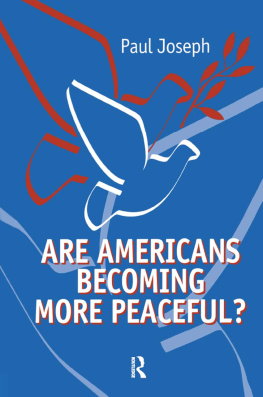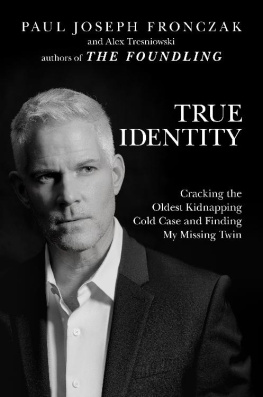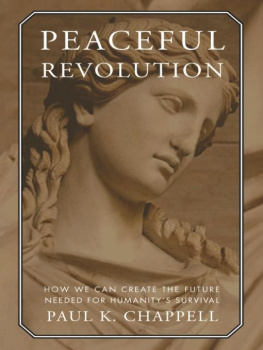First published 2007 by Paradigm Publishers
Published 2016 by Routledge
2 Park Square, Milton Park, Abingdon, Oxon OX14 4RN
711 Third Avenue, New York, NY 10017, USA
Routledge is an imprint of the Taylor & Francis Group, an informa business
Copyright 2007, Taylor & Francis.
All rights reserved. No part of this book may be reprinted or reproduced or utilised in any form or by any electronic, mechanical, or other means, now known or hereafter invented, including photocopying and recording, or in any information storage or retrieval system, without permission in writing from the publishers.
Notice:
Product or corporate names may be trademarks or registered trademarks, and are used only for identification and explanation without intent to infringe.
Library of Congress Cataloging-in-Publication Data
Joseph, Paul, 1948
Are Americans becoming more peaceful? / Paul Joseph.
p. cm.
Includes bibliographical references and index.
ISBN-13: 978-1-59451-299-5 (hc : alk. paper)
ISBN-10: 1-59451-299-X (hc : alk. paper)
1. United StatesForeign relations. 2. Terrorism. 3. Iraq War, 2003 4. Peace. 5. Television and war. I. Title.
JZ1480.A3J67 2007
303.660973dc22
2006021981
ISBN 13 : 978-1-59451-299-5 (hbk)
This book was designed and typeset in ITC Bookman Light by Straight Creek Bookmakers.
A book, Id answer.
What is it called?
Are Americans Becoming More Peaceful?
You must be kidding. At least that is what many of my friends and colleagues said after I told them the title of my project. Many chuckled, shook their heads ruefully, or just looked the other way. One or two even punched me on the shoulder, thinking that I must be joking.
I could see their point. After all, the United States is currently engaged in one medium-sized conflict in Afghanistan and a major war in Iraq. Its military forces are active in the Philippines and Colombia and are stationed at dozens of bases around the world. North Korea and Iran are the subjects of intense debate over the possible use of deadly force. The Pentagon has 1.5 million troops in uniform and officially spends more than $400 billion a year. Unofficially, it spends at least another $100 billion more. Measured by dollars or combat capability, no other country comes even remotely close.
Stepping back even slightly from the present, we can see the Pentagon fighting in Somalia and Kosovo, intervening in Haiti and Bosnia, and launching cruise missiles against targets in Sudan and Afghanistan. In 1991, the Pentagon mounted a major effort in the Persian Gulf War and continued to bomb Iraq intermittently until the start of the current war. And that list covers only the end of the cold war. Military force might or might not have been justified, but it was certainly used again and again. How could one possibly create an argument that Americans are becoming more peaceful?
My thesis concerns the American people, not the American government, an institution that is certainly not becoming more peaceful. In focusing on the public, I argue that a significant minority rejects war on principle, and that even more are becoming sensitive to war costs such as casualties to U.S. troops and to civilians on the other side. War opposition is multisided: some explicitly oppose armed conflict as a way for the United States to make policy, and some of these will resist war by participating in antiwar movements or through another form of direct disagreement. Another, larger proportion of the public can be characterized by its nonacceptance of war. These individuals opposition is more muted; it lies beneath the political surface and emerges only when the concrete results of people killing other people become apparent. This nonacceptance of war can be more potential than actual, and government officials seek ways to manage opinion so that prospective opposition remains beneath the surface. War management is carried out by the White House and the Pentagon and involves public rhetoric, a media strategy, and drawing upon popular beliefs and opinions that are decidedly not peaceful. The tension between the still uneven tendency of Americans to become more peaceful and the management of opinion to produce war support forms the organizational backbone of this book.
The strength of opposition to war fluctuates and is not always sufficiently influential to prevent war. But the need of administration officials to dampen potential opposition has changed the way that war is organized and conducted. Costs must appear low. If they do not, the negative memories of Vietnam will quickly emerge and principled opposition to war will be joined by the now many who think that the intervention is a quagmire with no light at the end of the tunnel. Conversely, successful war management will evoke more positive narratives from World War II. These competing memory sites, World War II and Vietnam, form one element of the broad collision between war opposition and war support.
While this framework is developed further in , From Mobilized to Conditional War, I can already anticipate some objections. In March 2003, the Bush administration launched Operation Iraqi Freedom, which received the support of more than two-thirds of the population. Saddam and the Baath regime were quickly overthrown and President Bush declared mission accomplished. Despite a growing insurgency and casualties, the failure to find weapons of mass destruction, and a prison scandal at Abu Ghraib, a war president was reelected in November 2004. What is so peaceful about that?
One answer is that the tendency of Americans to become more peaceful is at least partially countered by public fear, especially following the dramatic and devastating attacks against the World Trade Center and the Pentagon on September 11, 2001. Chapter 2, Managing Fear, reviews the record and impact of the Bush administration with respect to fear messages. But there is another side to September 11. Many academics and journalists predicted a broad set of changes in personal habits and civic life. Henceforth, Americans would read more books, give more to charity, spend more time with family and friends, follow the news more closely, and make decisions about flying, vacations, and use of public spaces with a new sense of (in)security in mind. I review those claims using evidence as diverse as smoking patterns, posttraumatic stress syndrome and television watching, travel plans, and public responses to changes in the color-coded alert level announced by the Department of Homeland Security.
After the initial overthrow of Saddams regime, the U.S. military presence in Iraq became a military occupation. A long search failed to find weapons of mass destruction or support for the other principal claim in support of the war, namely, that Saddam was connected to international terrorism. Prominent whistle-blowers and a series of official reports seemed to repudiate the factual claims of the administrations case. Yet a substantial minority of the public continued to believe that Saddam not only had weapons before the war began but that WMD had actually been found in Iraq. Many also thought that he was connected to terrorist groups or involved with September 11. These views certainly challenge my argument. How could Americans be becoming more peaceful when so many were failing the simplest entrance exam? , Managing Information, considers the knowledge base of the American public and the shape of its eventual learning curve on the claims advanced by the Bush administration. I also trace the implications of the publics war smarts for the quality of democracy and civic society in the country.









